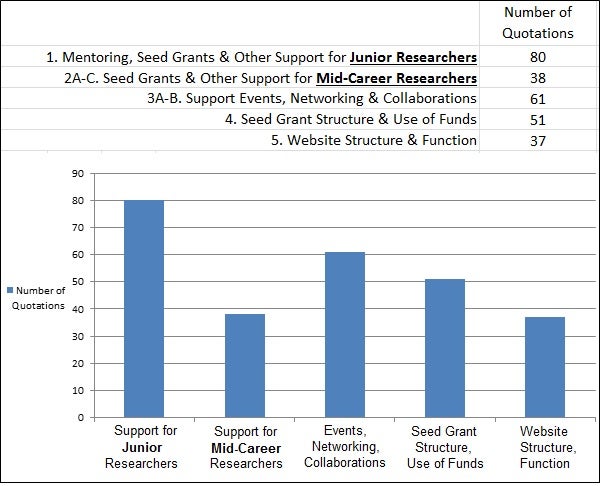Steven Mock conducted an environmental scan at the University of Waterloo. You can download the Environmental Scan Report (PDF), or you can read the report below.
Meetings with 59 faculty and staff at UWaterloo
Applied Health Sciences (AHS) - 30 researchers from three departments:
- Kinesiology
- Recreation and Leisure Studies
- School of Public Health and Health Systems (SPHHS)
Arts - four* researchers from two departments:
- Economics
- Psychology
Engineering - two researchers from one department:
- Mechanical and Mechatronics Engineering
Environment - one researcher from one department:
- School of Planning
Mathematics - three researchers from two departments:
- Computer Science
- Statistics and Actuarial Science
Science - ten researchers from five departments:
- Biology
- Chemistry
- School of Optometry and Vision Science
- School of Pharmacy
- Physics and Astronomy
School of Social Work (Renison University College) - three researchers
Theological Studies (Conrad Grebel University College) - one researcher
Librarians - two researchers (one from AHS, and one from Renison University College)
Office of Research - three staff members
*Note: Although we only met with 4 Arts researchers in one-on-one or small group meeting settings, at least 5 additional Psychology researchers watched Steve’s presentation about the NAR at the kick-off luncheon for the Successful Aging speaker series.
Coding and summarizing the notes from the consultation meetings
The Administrative Assistant for NAR read through all of the meeting minutes, and created codes based on the most frequent suggestions and feedback.
Below, there is a bar graph based on the content-coding, which includes the number of ideas that were linked with a particular theme or topic.
Table 1. Overview of Five Main Coding Themes and Frequencies Within Each Theme

These themes/topics are:
- Support for junior/emerging researchers (including mentoring, and other forms of support, such as seed grants to use for data collection) - 80 quotations
- Support for mid-career researchers - 38 quotations
- Support for events, networking and collaborations - 61 quotations
- Seed grant structure and potential uses of the seed grant funds - 51 quotations
- Website structure and function - 37 quotations
Code 1: Mentoring, seed grants & other support for junior researchers
1A – Mentoring by mid-career or senior faculty
1B – Seed grant funding for junior faculty
1C – Other support for junior faculty
1D – Buyout for mid-career/senior faculty, or they volunteer their time to mentor
Representative quotes:
Identify the mentors available, and identify who needs a mentor, and find people whose research interests match well
More than just a name added to a grant, because it would be much more useful to have a mentorship program
My successes were due to strong mentoring in my early career. My mentors donated time to help me make good decisions and get opportunities
Code 2: Seed grants & other support for mid-career researchers
2A – Grant writing assistance
2B – Seed grant funding
2C – Help setting up a research team
Representative quotes:
Make sure the mechanism does not leave out mid-career researchers, because they need support as well
They have data, they have a team, they just need help getting it out the door
Code 3: Support events, networking & collaborations
3A – Potential events
3B – Networking & collaborations
Representative quotes:
A group of researchers can apply for a team grant in aging research, so you should bring people together for a big grant that they wouldn’t have been able to receive individually
Have brown-bags, in house talks, group talks, workshops. Smaller commitments of time to get to know other researchers and form collaborations
Code 4: Seed grant structure & use of funds
4A – Seed grant structure
4B – Distinguish from the Chronic Disease Prevention Initiative (CDPI)
4C – Funding for pilot data
4D – Funding for grant writing
4E – Funding for transportation or equipment
4F – Funding for RAs or grad students
Representative quotes:
We want to see things that are unique and aging-specific. We don’t want to just help the same project twice. We need a mechanism, something systematic
Seed grant could be used for pilot data and travel, meeting with mentors
Code 5: Website structure & function
5A – Researcher profiles
5B – News, events, awards, links to other websites
5C – Networking tool, hub
Representative quotes:
Bring people together – The website will be a good hub and networking tool
Researcher profiles focused on aging research, highlight their expertise
Code 6: Research topics, divided by types of research
Research topics were divided into bench/basic research, applied research, and social/population-based research.
Code 7: Unique quotes
Supporting and highlighting the current research across campus at UWaterloo
Managing expectations, and being realistic about current realities, how difficult it is to get a larger external grant
Strengthen the ties with affiliated colleges, make sure they can be involved in the funding seed grants